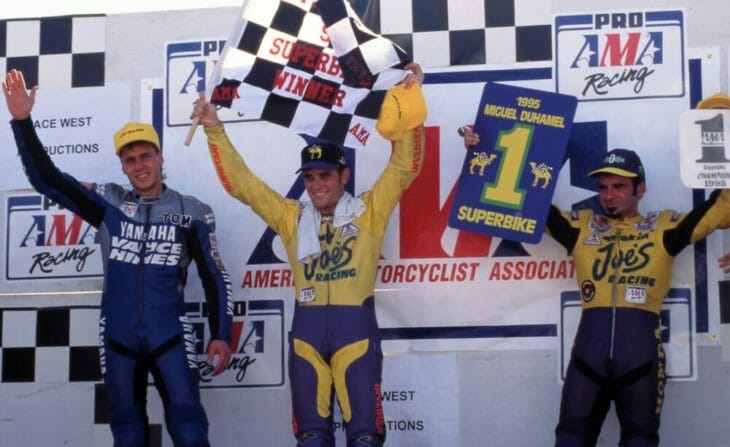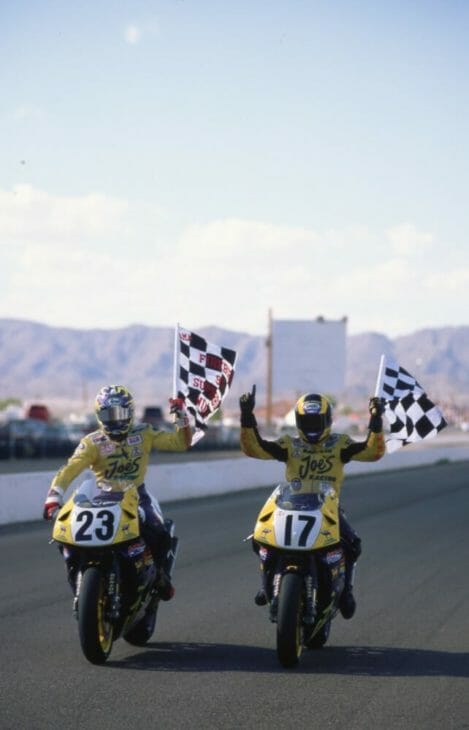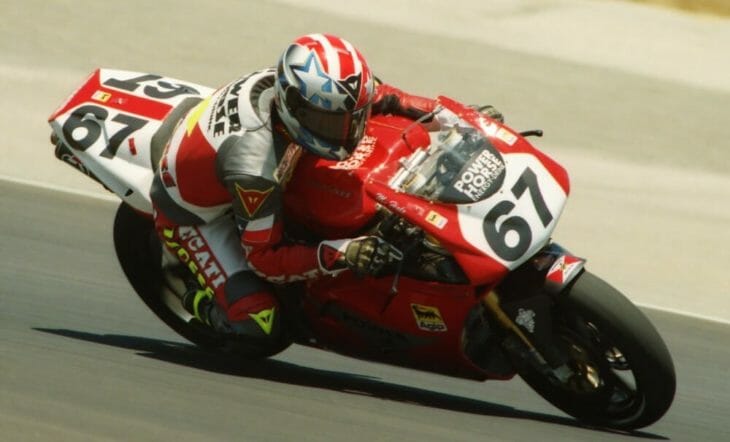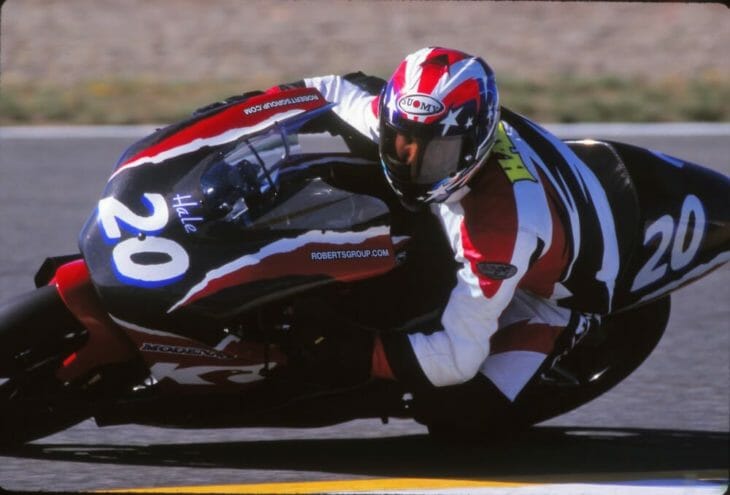Larry Lawrence | April 23, 2019
Archives: The Fateful Decision
The graph line on Mike Hale’s stock in 1995 was shooting skyward. It was Hale’s first full season in AMA Superbike class. At Pomona, in April of that year, he gave Honda its first AMA Superbike victory in three years. He led the championship through eight rounds of ten before a mechanical at Sears Point cost him a real shot at the championship. He also scored a podium in his first World Superbike race weekend that season. He ended the year at Firebird Raceway in Phoenix with a victory. The future was bright and the offers came flowing in.
Archives: The Fateful Decision
 Mike Hale was on the top of the world after winning the 1995 AMA Superbike season finale at Firebird Raceway. Honda wanted to keep him and offered him a path to GPs, but Hale had multiple offers on the table and went for a seven-figure, multi-year World Superbike offer. It was a career-changing decision. (Henny Ray Abrams photo)
Mike Hale was on the top of the world after winning the 1995 AMA Superbike season finale at Firebird Raceway. Honda wanted to keep him and offered him a path to GPs, but Hale had multiple offers on the table and went for a seven-figure, multi-year World Superbike offer. It was a career-changing decision. (Henny Ray Abrams photo)
American Honda saw Hale as the future and very much wanted to keep him in the series. The problem was the team had the two best riders in the series in Duhamel and Hale. Even Honda’s considerable racing budget could not match the offers Hale’s management team was entertaining. In a last-ditch effort to keep Hale on the squad, they offered him a path to Grand Prix racing. It was a route that Nicky Hayden would follow a few years later.
In his heart, Hale knew the Honda offer was solid and the GP part did make him stop and seriously consider what might be the best path forward.
But the money being waved in front of him in Europe was just too good to turn down. He made a pivotal and ultimately career-changing decision. He would choose a lucrative offer from Promotor Racing Ducati, a factory-backed World Superbike squad sponsored by one of the earliest energy drink makers Power Horse.
 Mike Hale (No. 23) may have been the hottest up-and-coming road racer in America at the end of 1995, but Honda already had the best road racer in the country in Miguel Duhamel (No.17) who won the ’95 AMA Superbike Championship. Even with the major racing budgets at American Honda in the mid-’90s , it was not realistic to be able to keep both riders on the same team again in 1996. (Henny Ray Abrams photo)
Mike Hale (No. 23) may have been the hottest up-and-coming road racer in America at the end of 1995, but Honda already had the best road racer in the country in Miguel Duhamel (No.17) who won the ’95 AMA Superbike Championship. Even with the major racing budgets at American Honda in the mid-’90s , it was not realistic to be able to keep both riders on the same team again in 1996. (Henny Ray Abrams photo)
“At that point, we were just on such an arc,” Hale recalls. “It was crazy the phone calls and people that were calling offering rides. Ducati at the time was World Superbike champs. Troy Corser was a good friend of mine. To be honest, I did want to stay with Honda. I really, really did, but they just didn’t have the budget. They had Miguel and he had just won the title. He was in the middle of a multi-year deal which was a heavy-hitting contract, too, which I understood. But the difference in the two offers was not even in the same ballpark, and I had never had been offered contracts that were multi-year with that many commas, and with what appeared to be good equipment and all the right ingredients. So that’s why I made that decision.”
Unfortunately for Hale, the Power Horse offer ultimately proved to be a mirage. The team experienced financial difficulties and the budget dried up, leaving Hale, the crew, and even Ducati, who was supplying bikes to the team, scrambling just to finish the season.
A season of injury and lackluster results with the failing team put Hale’s career into a downward spiral. He had enough talent to keep finding rides, including a season in Grand Prix, but he never recovered the momentum he had with Honda.
Like most of the great American road racers of that time, Hale came up through flat track ranks. He was one of the most talented up-and-coming flat track riders of his era. In 1990 the Texan was named AMA Rookie of the Year, solely on the efforts of him and his dad Bob. He ended the 1990 season with a victory in the Camel Challenge at Sacramento, winning $10,000 and beating Scott Parker and Chris Carr.
 Mike Hale accepted a million-dollar-plus contract to race for Promotor Ducati in 1996, sponsored by early energy drink Power Horse. Unfortunately the team ran into financial difficulties mid-way through ’96 and Hale stopped getting paid. (Henny Ray Abrams photo)
Mike Hale accepted a million-dollar-plus contract to race for Promotor Ducati in 1996, sponsored by early energy drink Power Horse. Unfortunately the team ran into financial difficulties mid-way through ’96 and Hale stopped getting paid. (Henny Ray Abrams photo)
With flat track being Hale’s focus, the opportunity to road race for the first time was almost an afterthought.
“Bill Bartels had this dirt track side, but he also had the 883 sportsters going in road racing,” Hale recalls. “I think it was the US Twins Championship. Bill said, ‘Mike, you should come try these,’ because Tripp Nobles and Nigel Gale were riding them at the time. I said, ‘Sure, I’d love to.’ We had an off weekend so I flew into Boston and Bill picked me up and we drove up Loudon, New Hampshire together. That was my first road race, and it was an AMA National on the Harley.”
Amazingly Hale finished on the podium (third) in his very first road race national. That made a lot of people on the road racing side sit up and take notice. Within a couple of years, he’d made a successful transition from flat track to road racing. After winning a number of Harley 883 road races in ’93, he was signed by Honda for 600 Supersport in ’94. That year he also got a one-off Superbike ride at Loudon on an outdated Honda RC30, and stunned everyone by qualifying on the front row, third behind only Troy Corser and Fred Merkel.
It was not a hard choice then for Honda to move Hale up to a full-time Superbike ride in ’95, viewing him as their rider of the future.
After leaving Honda at the end of ‘95, there wasn’t much to cheer about with the failing Promotor Ducati team in ‘96, but then a glimmer of hope.
“I dang near got on the podium at the last race of the year,” Hale remembers. “It was at Phillip Island. I was drafting with Colin right at the line, but he got me for third. But that really helped me at the end of the season finish it in a way that I could feel good about myself. At least a little bit of sunshine. Did that and then I want to say the next day Suzuki was calling me for their world superbike program.”
 Mike Hale got his shot at Grand Prix racing in 1999 as a rider for the Proton KR Modenas squad. It proved to be the right series on the wrong machine. Mechanicals, crashes and injury plagued Hale’s season in the premier road racing championship. (Henny Ray Abrams photo)
Mike Hale got his shot at Grand Prix racing in 1999 as a rider for the Proton KR Modenas squad. It proved to be the right series on the wrong machine. Mechanicals, crashes and injury plagued Hale’s season in the premier road racing championship. (Henny Ray Abrams photo)
The Suzuki offer was a godsend. The team was developing a new GSX-R and Hale was mainly just fighting to be inside the top-10, but at least he was on a solid team and was getting paid.
Then Hale took an offer to come back to America and race Ferracci Ducati, but on unfamiliar Michelins, He struggled and left the team mid-season to take a GP development offer with Swiss Auto.
“Me and Luca Cadalora were the test riders doing that program,” Hale said. “So that was a lot of fun. But that also opened the door because of my results from that. Then Kenny [Roberts] offered me a contract to race for his team in 500 GP in ’99 the following year.”
While Hale finally got the chance to race GP, riding the Modenas KR3 proved to be a challenge and he, like several of his teammates that year, ended up suffering injuries trying to ride the bike.
After the ’99 season Hale did some car racing, but then came a call from Honda to come back to AMA for the 2002 season. He raced Formula Xtreme and Supersport for Erion Honda and managed some strong performances, including podiums in FX and a pole in Supersport. Then he raced on-again and off again through the 2006 season, ending his career riding for Buell in Formula Xtreme.
Today Hale is a successful businessman and runs a number of insurance agencies.
He chooses not to dwell on what might have been, instead confident in the fact that he made decisions that just about anyone would’ve made in his shoes, but you cannot help but wonder the path Hale’s career might have taken had he stayed with Honda.
Click here to read this in the Cycle News Digital Edition Magazine.